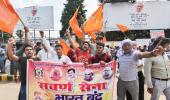'The common belief in political circles is that if you provide reservation to somebody, s/he will automatically come up.'
'This is a very faulty understanding.'

A key bill to provide Constitutional status to the National Commission for Backward Classes has finally secured Parliament's approval.
The 123rd Amendment Bill 2017 was cleared by the Lok Sabha on August 2, 2018, superseding the amendments passed earlier by the Rajya Sabha.
The Bharatiya Janata Party calls it a historic bill while other parties describe it as a political move, passed with the coming assembly election in Chhattisgarh, Madhya Pradesh and Rajasthan.
"Just giving Constitutional status will not make it a historic decision," Dr Satendra Kumar, below, professor at the Gobind Ballabh Pant Social Science Institute, Allahabad University, tells Rediff.com's Shobha Warrier.
Do you think the 123rd Amendment providing Constitutional status to the National Commission for Backward Castes is historic?
Or is it just a political stunt with the assembly elections in mind?
I won't call it historic or anything like that. It is more political.
Just giving Constitutional status will not make it a historic decision. If they had really wanted to do something, they should have paid attention to issues like sub-categorisation, creamy layer and the complex index of backwardness.
What has happened in a simple effort. I am not denying there are some positive aspects to the amendment. It will definitely help, but you cannot call it historic.
Will it empower the backward communities in India?
Yes and no.
Yes, it is different from the earlier commission (the National Commission for SC/STs) in the sense that it gives equal power to the commission for backward castes.
It also gives the same power as civil courts to the commission which is a special feature under which the OBCs can go the commission and file a case.
For example, if somebody feels discriminated against or if atrocities are committed against them, they can file a case at the commission.
Till now, OBCs did not have access to such a court; they had to go to the police and the police may act or may not to the complaint.
OBC is a very large umbrella category. On one side, there are powerful caste groups and on the other side, there are a lot of marginalised groups also.
There is a large disparity within the OBC group itself. So, there is a fear of misusing the powers by the powerful groups.
At the same time, it can act as a safeguard for the less powerful groups among the OBCs. So, it can empower and help these people.
Now, to the no part of my answer. Just by providing Constitutional status to the commission will not cure the ills because a lot depends on implementation.
Do you feel what is more important is a change in the attitude of society?
We have had this commission of SCs and STs for quite some time, but it has not really been empowered even now.
Yes, implementation has to happen, also the attitude of society has to change.
The institution has to have the capacity to implement. Also, the leaders and bureaucrats have to have the attitude and willingness to implement them.
Do we have the infrastructure to implement?
What do you mean by infrastructure?
The states: Do they have the capacity to implement the ideas? Do they have the resources to take care of the interests of these groups?
What we need is a multi-layered programme.
Reservation is just one aspect of the whole programme.
The common belief in political circles is that if you provide reservation to somebody, s/he will automatically come up. This is a very faulty understanding.

What is more important: Political will or attitudinal change in society?
It is not one or the other; both are important.
Political will is needed to implement policies. Intervention of the State is also very important in any society or country.
At the same time, society at large has to play an important role in the whole exercise.
If you look at how changes have taken place in south India, particularly in Kerala and Tamil where social and religious movements have played a crucial role in the way society changed.
When a social movement becomes a political movement, it becomes a part of the State.
Like the Dravidian movement became Dravidian parties and started dominating the political scene?
Yes, these movements played a significant influence in the trajectory of the backward class movement and also in the development of these communities.
Why do you think such movements did not happen in northern India? Is it because lack of education or because the other communities are very strong?
There are a couple of reasons for this. In the northern belt, the coalition of Brahmins and Kshatriyas is very strong. They constitute around 20% of the population in north India, particularly in UP and Bihar.
You should compare this with the 3% to 4% Brahmins in Tamil Nadu. More than that, these Brahmins have moved away from formal politics.
The upper caste dominates formal politics in northern India or the cow belt.
For example, they constitute more than half the population in UP and Bihar. So, they have their agenda in the political domain even if you have commissions for the backward communities.
The Centre has said the NCBC applies only to the Centre and has no relation to the states. Are the states not supposed to implement the policies?
It is like this. You have an institution that will be run by the central government like all central government-run organisations. You also have institutions run by the state governments.
What happens is the Centre is not going to direct the state governments on how to function.
The states can have their own list of OBCs and they can launch their own programmes.
How does the NCBC function then? How will it empower OBC communities?
Like I said earlier, the commission acts as a civil court. People can make a complaint at the commission if the police do not listen to their complaints.
People can ask the NCBC to intervene if they feel their interests are not taken care of.
This is only one aspect. What they have not looked into is the sub-categorisation of OBCs which is a long pending demand.
After the Mandal report, various communities have been demanding this. The earlier NCBC also had demanded that the OBC community should be divided into three categories -- Backward, Most Backward and Extremely Backward.
I feel they blew up an opportunity while creating the NCBC. They should have done two things. Sub-categorisation should have been introduced while creating the NCBC. They should have also looked into the creamy layer debate.










